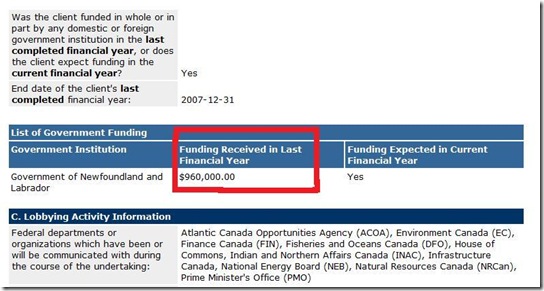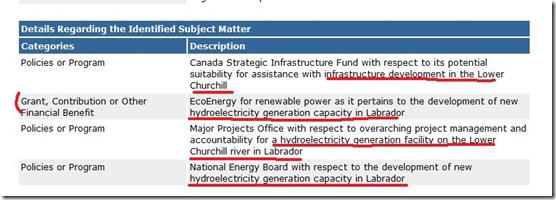Information provided on the federal lobbyist registry about lobbyists hired by the provincial energy corporation is wrong to the tune of hundreds of millions of dollars.
Plus it is also for something other than what the lobbyists are registered to lobby about.
That’s according to Kathy Dunderdale, the province’s natural resources minister. Presumably, the information was supplied to the federal registry by the lobbyists when they registered.
The province’s natural resources minister claims that the figure $960,000 listed on a federal lobbyist registry entry as cash received by the client for government funds isn’t for fees paid to the lobbyists.
Dunderdale issued a news release today to refute opposition claims that the provincial energy corporation was dropping almost a million bucks a year on lobbyists while at the same time the provincial government was dropping another bundle to pay for Our Man in a Blue Line Cab who is supposed to be the province’s point man for all things in Ottawa.
Dunderdale says the figure on the federal lobbyist registry was:
…funding received by Nalcor from the Government of Newfoundland and Labrador for three specific projects related to the Northern Strategic Plan, a rate subsidy for isolated and remote communities powered by diesel, and energy-related studies for the Department of Natural Resources – all unrelated to Summa. The fact that this was not a payment to Summa was evident from the website of the Office of Commissioner of Lobbying, but was misreported by the Opposition.
Okay.
So that’s exactly what your humble e-scribbler did.
Right off, here’s one entry for the lobbying firm and here’s a picture of the section of the website where the figures are presented.

The same information is the same as the entry for another lobbyist from the same firm currently working the same file. Here’s the bottom of the second lobbyist entry which - incidentally - is identical to the first:

The information on that financial line is supposed to be government funding received by the client, in this case NALCOR Energy. You can confirm that by checking the guide provided by the lobbyist registry:
- Source and amount of any government funding provided to the client, as well as information indicating if the client is expecting to receive public funding; and…
Now if Kathy Dunderdale is right, that figure of $960,000 is related to something other than the Lower Churchill and it also isn’t related to the lobbying firm, Summa Strategies.
So why is it there?
Really good question.
Unfortunately, Dunderdale didn’t answer it in her news release.
If that wasn’t bad enough, the lobbyist entry is about the Lower Churchill and the client is identified as NALCOR Energy, the holding company that includes all the provincial government’s energy holdings.
Under those circumstances, the entry should include - at the very least - the hundreds of millions paid in the past two years by the provincial government to purchase oil stakes and other money transferred from the provincial government to fatten NALCOR up financially.
Dunderdale didn’t offer any explanation of that in her news release either.
This wouldn’t be the first time Kathy Dunderdale blundered badly on a matter within her portfolio.
In 2006 Dunderdale was embroiled in controversy over a patronage appointee who violated the province’s public tender act. Dunderdale made repeated statements about the issue some of which contradicted other statements. in the end, the government was forced to close the legislature early to avoid further embarrassment.
In 2008, Dunderdale said the provincial government was considering a law suit against Quebec and Ottawa over the 1969 Churchill Falls contract. She later claimed she “misspoke”, a line she maintains to this date despite evidence the government has been considering some form of legal ploy on the contract for some time.
In September, 2009, Dunderdale gave wrong information about the failure of talks with Rhode Island on a potential sale of Lower Churchill power. She said “that they did not have the capacity to negotiate a long-term power purchase agreement with Nalcor on behalf of the Province. Nor were they able, in their Legislature, to do the regulatory changes that were required in order to wheel electricity into the state.”
According to the Rhode Island governor’s office:
As far as we can determine, there is no legislative hold up here in Rhode Island, it is more of a question of cost. While the power generation is inexpensive, the cost of transmission adds to the final price. The possibility of purchasing power is still alive….
The salvation for Dunderdale in this case is that she scored a minor victory on what the cash was really about.
Unfortunately Dunderdale put the government’s lobbyists in an even deeper spot over the amount they apparently did report to the federal lobbyist registry.
Ouch!
-srbp-



